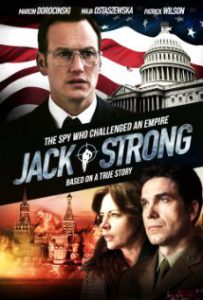During the Cold War, one of the most productive Warsaw Pact spies for the CIA was Ryszard Kuklinski, a Colonel in the (then communist) Polish Army, codenamed “Jack Strong”. From 1972-1981, Kuklinski provided a valuable stream of information including technical data for the T-72 tank, Soviet nuclear strategies, and plans to suppress the growing Solidarity labor movement in Poland. His contribution was so renowned in the US that, later, National Security Adviser Zbigniew Brzeziński called him “the first Polish officer in NATO”. Now, Kuklinski’s exploits have made it onto the silver screen thanks to the 2014 Polish film Jack Strong.

Jack Strong is half thriller, half biopic. Rightfully so, it has all the trademarks of an espionage classic–hollow brick dead drops, ruthless Soviet villains, and nifty miniature cameras. At the same time, it tells the story, albeit dramatized, of a real historical figure. The film traces Colonel Kuklinski’s entire spying career, starting from his first contact with the CIA to when Soviet counterintelligence started to catch on to his activities.
Though its first scene, the execution of Oleg Penkovsky (a Russian who famously spied for NATO), is quite eye-catching, Jack Strong gets off to a slower start. Kuklinski’s initial liaisons with the CIA seem rather casual for a spy thriller. If you don’t have any knowledge of Polish or Cold War history, you’ll also have to suspend a fair bit of disbelief to believe in Kuklinski’s motivations for spying. It’s not until the second half of the film that the suspense and thrill comes out in full force. Whereas in the first half Kuklinski is still undergoing rough character development and finding his bearings as a spy, in the second half he becomes increasingly nervous as the stakes rise and Soviet counterintelligence close in, setting the stage for a panoply of nail-biting scenes.
Independent of the main plot progression, the film also deploys another crafty and highly effective suspense-building technique. Every so often, the main storyline cuts away to an older Kuklinski being interrogated in a dark room, though when and by whom remain unclear until the film’s very end. Though at first they don’t seem too remarkable, three-fourths through the film these brief interrogation intermissions have built up so many spring-loaded questions that you’re itching for answers.
While the film itself is entertaining, what’s even more interesting to me is the fact that it was made to start with. Jack Strong depicts Kuklinski as a righteous hero –he refuses any payment for his information, he’s faithful to his family, and he doubles down on his espionage even when his handler advises him to lay low to avoid detection.
However, the real-life Kuklinski hasn’t always been viewed so positively. Even if he spied for the eventual victors of the Cold War, Kuklinski still technically betrayed the trust of his colleagues and the Polish government that he swore to serve. Therefore, after the Iron Curtain fell and Poland democratized in 1990, the new Solidarity government led by Lech Walesa initially refused to restore Kuklinski’s legacy with a pardon. It was only after the US implicitly made pardoning Kuklinski a precondition for Poland’s accession to NATO did the country’s government act.
Throughout the 1990s, public opinion polls showed Poles heavily divided over Kuklinski, with a majority oftentimes seeing him as more traitor than hero. The fact that such a controversial character has now been lionized in a mainstream Polish film perhaps speaks to the country’s’ recent social and political climate.
As Poland prospers as a steadfast member of both NATO and the EU, it looks back at its communist past with a sense of nationalistic dread. Influenced by both domestic trends and the scepter of Russia’s intervention next door in Ukraine, Polish politics has increasingly titled rightwards in the past few years. Today, when seminal democratization figures like Lech Walesa are being accused as Communist collaborators, Poland may be looking for new heroes, heroes like Ryszard Kuklinski.
Overall, Jack Strong offers a compelling dramatization of a true story that takes its time to build a solid arsenal of suspense. Though those familiar with Polish history and politics will certainly appreciate it more, those who are not can still be entertained.
Jack Strong–Poland. Dialog in Polish with some English and Russian. Directed by Władysław Pasikowski. First released February 2014. Running time 2hr 8min. Starring Marcin Dorociński, Maja Ostaszewska, and Patrick Wilson.
Want to support Cinema Escapist and the filmmakers? Purchase Jack Strong with our Amazon affiliate link. We appreciate your assistance!